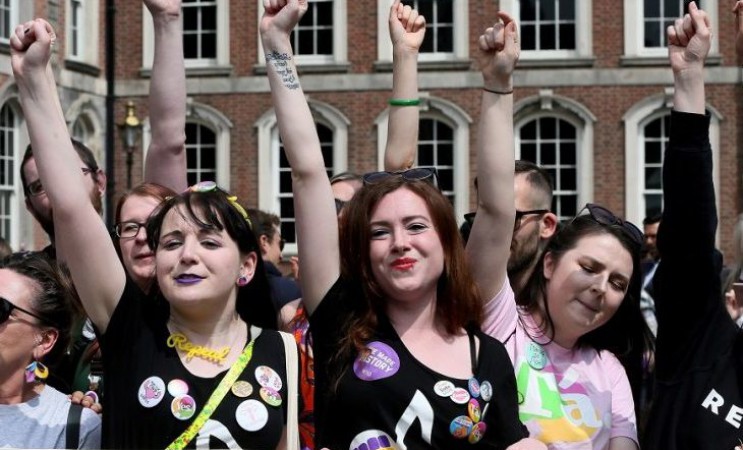Nowhere in the world have the women’s mobilisations been as important as now. They do not intervene exclusively in defence of their rights, right to contraception, to abortion and equal pay, but to change society in depth. They do this in a context of growing violence from ultraliberal austerity policies which sharpen the inequalities, reducing the individual and the collective liberties.
The women’s struggles are shaking the world. They free the tongue of women who have been sexually abused. They challenge deeply backward patriarchy, the relations of power and dominance, and the burden signified by the religions of every kind. The feminist movements of today make an incorporation between themselves and a wider struggle that targets the capitalist system and what it produces of violence, aggression, constraint, discrimination and non-respect of the human being.
The women’s mobilisations in the United States
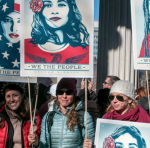
On 21 January 2017, the day after the inauguration of Donald Trump, millions of North American women stood in the biggest demonstration in US history. That event was followed on 6 October 2017 by the ≠me too movement. Women declared themselves to be the victims of sexual harassment, violations, threats and psychological pressures[1], in the world of work as much as among students and in universities. The ≠me too movement grew in all directions to become a remarkable social phenomenon. In France, it was followed by an appeal called #Balancetonporc[2](18 October 2107) which received tens of thousands of supporting messages in a very short time.
On 20 January 2018, The Women’s March[3]garnered more participants in the United States than in the anti-Vietnam demonstrations of 1969 and 1970 at their peaks, or against the Iraq war in 2003.
Speech liberation has come to the Hollywood actresses. They break the taboo that used to keep them, for the sake of a role, subjected to the sexual violence of film producers, screen writers or actors. Such reactions [of protest] in the social networks and in all the sectors of society can only happen because a deep process of maturation is taking place in society.
The political world has not been spared either. Important testimonies brought to light the abuses of power perpetrated by Donald Trump who boasted on TV about his way to “catch women by the pussy”, actresses, journalists or Trump Tower receptionists. Some 140 women[4]signed a public letter to denounce the macho culture and daily harassment at the Capitol of Sacramento (seat of California’s government). Where money is at the heart of all things, it buys the silence of victims. It is a source of blackmail at work and the reflection of a society in full deliquescence.
In marching together for their lives, the women demonstrate that time has come to regroup and organise urgently against the policies of the US government. They show that it is necessary to mix the struggle to defend the minorities, reject precariousness, support the right of women to dispose of their bodies, with the struggle against war, the free sale of guns, economic exploitation, the non-respect of ecological transition, the inhumanity shown to the immigrants and their fates. This gives a new dimension to the mobilisation of the women of the world.
From Spain to Ireland, from India to Latin America

On the 8th of March this year (2018), the International Woman’s Day was occasion for a formidable movement of collective consciousness. In Spain, almost 6 million women mobilised. They declared themselves on strike. They denounced the large salary gap between men and women, the part-time jobs, the great precariousness of women’s work, the VAT hikes on feminine products – “more than enough reasons to go on strike” they said. Meanwhile, the 900 suspects of corruption in the Peoples Party (the Conservative Party in government) have yet to see any charges against them.
This type of injustice was denounced on 28th April in Pamplona when women took to the streets in anger at the verdict against the 5 men who, in 2016, had gang-raped a young 18 year-old woman and circulated images of her on the internet. Each man was condemned to jail for 9 years[5] for the lesser offence of ‘sexual abuse’ on ground that “the victim had not resisted enough”. With great indignation, the women protested this trivialisation of rape, this kind of justice dominated by patriarchy and machismo. They gathered more than one million signatures in a petition that demanded the resignation of the three judges involved.
In Ireland, the YES won in the referendum of 25th of May to scrap the constitutional dispositions banning abortion. This was a very important step forward in that ultra-conservative and Catholic country where the Church hierarchy does not differentiate between abortion and murder. The movement “Together for Yes” surpassed all the survey’s expectations and prognoses, with the strong participation of the women (70%) and young people. This is a historic victory for the Irish women who, for over 30 years, have been forced to abort abroad to access decent sanitary conditions.
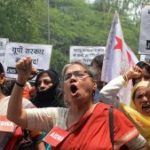
In India, the women have been struggling for years under the burden of religion and the traditions of Hinduism. For women, this means a constant and total submission to man – the father when they are young, then the husband, and then the son when the father dies. Practices around dowries give rise to incredible acts of violence, like the murder of little girls at birth due to the enormous financial constraints entailed. Yet equality of citizens’ right is inscribed in the Indian Constitution.
The collective rape of a young girl in a bus in New Delhi in December 2013 triggered big mobilisations to uphold human dignity and real equality between the sexes, against these patriarchal and feudal traditions. The government was obliged to take measures to better protect the women.

In Latin America, there have been very strong women’s mobilisations too. In Peru, they obtained the start of an enquiry into the forced sterilisation programme by ex-president Alberto Fujimori (between 1996 and 2000) on nearly 300,000 women and the vasectomy of some 22,000 men. This programme of ‘National Reproductive Health and of family planning’ had been aimed at one social group in particular: the poor and Quechua-speaking indigenous population. To deprive sectors of a population of their progeny amounts to condoning not only acts of sexual violence against them, but of racist crimes as well, which have all evaded the law up to now. Fujimori was condemned to 25 years in jail for crimes against humanity, but he was pardoned for these in December 2017 and he was never charged for the mutilations and the sexual violence he perpetrated during his mandate.
In Argentina, abortion remains a crime which carries a prison sentence for homicide. In March, a Law project was put forward for the seventh time by the Platform of the National Campaign for Legal Abortion. It had the support of 71 parliamentarians, as much of the left as of the right. The consequences of clandestine abortions have a dramatic impact on health, with many cases ending up in death. The women of the Platform demand: “Sexual education in order to decide, contraceptives in order not to abort, and legal abortion in order not to die”. Here you have a political combat with a class character, because equality cannot exist where an abortion costs 10,000 dollars in a private clinic.
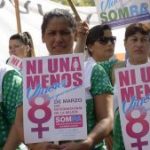
In the month of June, the most recent women’s mobilisations in Argentina denounced the acts of violence against women with the penalisation of abortion. In the course of the last three years, the movement ‘Ni Una Menos‘ [6] – that denounced the scourge of illegal abortions with 251 women dead during the year of 2017[7] – posted the following in Buenos Aires: “We want our women alive, free, and free of debts”. This struggle added its weight to the other protests against the reactionary measures of Mauricio Macri who bows to the IMF’s diktats and austerity. This seventh attempt at the Law wanted abortion legalised for 14 weeks, in sanitary establishments, either public or private. The Bill passed in the Lower house on 14th June 2018, but it was only a start, because it still has to come before the Senate in August[8]
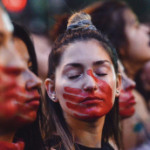
In Chile, women students blocked some 30 universities since April. They denounce the permanent sexual harassment in education from professors who are never sanctioned for it. And this, as part of the violence against women becoming banal at all levels of society, in the street, at work, at the doctors’, in the home. Women demand a change in the law, because the present Constitution is still the one of Pinochet. They want women and men’s equality inscribed in the Constitution. The State is responsible to make mentalities evolve in matters like divorce, the rights of children conceived outside marriage or the morning-after pill.
After 28 years of prohibition, the legalisation of abortion was won in Chile in 2017 in the following cases: rape, risk to the woman’s health, and foetus non-viability. The struggles led by the women in Argentina – for the right to free, secure and universal abortion – has given great hope to the Chilean women for the battles they have ahead.
And the situation in France today?
According to Emmanuel Macron, equality between women and men is one of the great causes of his five-year term. In November 2017, he declared that “France must stop being one of those countries where the women are afraid”. He unblocked one million Euros and started on a plan which now competes with the existing, official and specialised Associations’[9] that have defended women’s rights for years. An organisation like the AVTF – a European Association in “Defence of women Victims of Sexual Violence at Work” [10] started receiving floods of calls in December 2017 by women reporting acts of violence and harassment. The Association asked the State to increase its subsidy in order to cope, but it was turned down. To deal with the volume of cases, the Association had to cut its telephone lines for five months.
A Bill for a new law is being drafted in France to shore up the struggle against sexist and sexual violence. Recently however, some legal judgements brought to light the case of rapes that had been re-defined as simple “sexual attacks”, and the cases of acquittals which were granted on ground of “no constraint upon the victim”. Proven acts of rape are being minimalized in this way, and the weight of guilt is shifted towards the victim. Equality between women and men is not a reality to reach us tomorrow.
Let us recall that in France, out of over 86,000 cases of women victims of rape, only 21% reach the police station and only 10% lead to a complaint. This is a societal problem. It places at the centre of the concern what are the means used to welcome persons made to feel culpable and their complaints discouraged. This leaves complete impunity to the authors of sexual crimes. And when such violence happens in the couple, this impunity is even greater, the harm done even graver. These situations call into question also the way in which acts of physical or sexual violence are followed up with the victims, men or women, the lack of accompaniment of unrecognised sufferers, the effects on health which can go from degrees of depression all the way to suicide. All this has a substantial economic impact on the whole of society.

Justice does not apply therefore to every one the same. A recent study by the “Defenseur des Droits”[11] shows that women-lawyers are very often harassed and less well paid than their male counterparts. 53% of them have reported discrimination at work. A majority said they did nothing about it because nothing would be done anyway, they would not have the necessary proofs, or they feared reprisals. For these women, ordinary sexism is expressed in their profession within their roles unjustly de-valorised, with part-time and thankless tasks, as well as pressures not to take holidays or maternity leave.
In the framework of the Reform of the Constitution, the High Council to Equality between men and women[12](HCE) proposes to enshrine this Equality as a fundamental value, along with the right to contraception and to abortion. These rights are under threat today, in Europe and the world, where the political context sees the advance of extreme right wing movements and the revival of reactionary religious ones. This shows in Poland where Catholic bishops are campaigning to end abortion rights.
The capitalist system is not able to change this order of things. It cannot institute real equality between women and men because it is based on relations of power and of competition, relations rooted in private property. The latter generate a conservative organisation of the family that relegates woman and puts her in a subordinate role.
This is how – under the cover of egalitarian sharing – the Gender Parity Laws were introduced in the political world a few years ago[13]. This measure is nothing progressive, and it will never make woman the equal of man by the use of quotas. This simulacrum is easy to see: If in 1997, 10% of the MPs were women, the Parity Laws never allowed for the 50% it had announced. Women are only 38.7% in the National Assembly and 31.6% in the Senate. Much remains to be done therefore about equality between women and men in the country of the rights of man, which will perhaps soon be transformed in the Constitution into “the country of human rights” aimed at putting women and men on the same plane, at least on paper.
Les Posadistes, 28.7.2018
